Africa
Gabon awaits presidential election outcome after peaceful vote

The majority of polls closed in the oil-rich Gabon on Saturday in a presidential election that the country’s military rulers hoped would legitimize their grip on power.
It’s the first election since a 2023 military coup ended a political dynasty that lasted over 50 years. Analysts have predicted an overwhelming victory for the interim president who led the coup. The polls were due to close at 6 p.m. local time, but there was no official confirmation from the authorities. Interim results were expected overnight or on Sunday.
Some 920,000 voters, including over 28,000 overseas, were registered across more than 3,000 polling stations. A third of the country’s 2.3 million people live in poverty despite its vast oil wealth.
The interim president, Gen. Brice Clotaire Oligui Nguema, 50, the former head of the republican guard, toppled President Ali Bongo Ondimba nearly two years ago. He hopes to consolidate his grip on power for a seven-year term in office.
After casting his ballot on Saturday in the capital, Libreville, Oligui Nguema said: “I have a feeling of pride, I have a feeling of joy. I see so much enthusiasm from the Gabonese people gathered here and who want to turn the page to join the new Republic.”
He called the election “transparent” and “peaceful.”
Bongo was placed under house arrest after the coup, but then freed a week later due to health concerns. His wife and son were detained and charged with corruption and embezzlement of public funds. Bongo himself was not charged.
Following the coup, Oligui Nguema promised to “return power to civilians” through “credible elections.” But he proclaimed himself the interim president and then a presidential candidate, following the adoption by the parliament of a new contentious electoral code allowing military personnel to run.
He has touted himself as a leader who wants to unify the Gabonese and give them hope, running his presidential campaign under the slogan: “We Build Together.”
The country’s new constitution, adopted in a referendum in November, has set the presidential term at seven years, renewable once, instead of the unlimited fiver-year term. It also states family members can’t succeed a president and has abolished the position of prime minister.
A challenger with an anti-colonial approach
A total of eight candidates are running for president.
However, Oligui Nguema’s main challenger is Bongo’s former Prime Minister Alain Claude Bilie-By-Nze, who, in a recent interview with The Associated Press, pledged “a break with the old system and a new independence. Political, diplomatic and economic independence.”
In a region where France is losing longstanding allies in many of its former colonies, Gabon stands out as one of only a few where that partnership has not been threatened. It still has more than 300 French troops present, one of only two African countries still hosting them.
Oligui Nguema has not signaled an end to the French military presence, but Bilie-By-Nze has said “no subject is off limits” in renegotiating the ties between the two countries.
Bilie-By-Nze also said during the interview with AP that he didn’t expect the election to be fair or transparent. “Everything has been done to lock down the vote,” he said.
However, earlier this week, Laurence Ndong, spokeswoman for Oligui Nguema, denied the allegations, saying: “For the first time, Gabon will have a free and transparent election.”
Bilie-By-Nze voted on Saturday in his hometown of Makokou in the north of the country. In a video message, he said he was concerned that unused voting cards could be used for potential electoral fraud.
‘The military has failed’
Voters lined up early Saturday in the capital, Libreville, as the election progressed peacefully.
Jonas Obiang told the AP while waiting to cast his ballot in the working-class district of Damas that he would choose Bilie-By-Nze because he viewed the 2023 coup as a continuation of the malpractice.
“General Oligui Nguema led the country with the same people who plundered the country, the former members of the Bongo regime. I will not vote for him,” he said.
His views were echoed by Antoine Nkili, a 27-year-old unemployed man with a master’s degree in law.
“The choice is personal, but I’m telling you that for me, the military has failed,” Nkili said. “They promised to reform the institutions, but they haven’t. Instead, they’ve enriched themselves.”
Jean Bie, 57, who works in the construction sector, said the military rule has benefited the population.
“In 19 months, General Oligui Nguéma has completed several projects expected of the former regime. I’m voting for him, hoping he’ll do more over the next seven years,” he said.
Africa
Ramaphosa suspends police minister amid corruption allegations
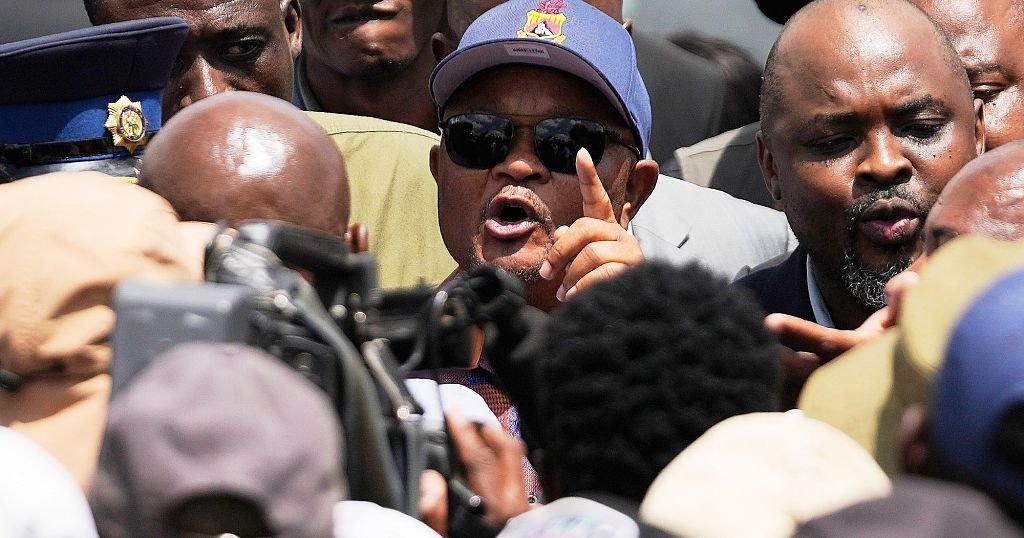
South African President Cyril Ramaphosa has suspended Police Minister Senzo Mchunu following serious allegations made by General Nhlanhla Mkhwanazi, a top police official. Mkhwanazi accused Mchunu and Deputy Police Commissioner Shadrack Sibiya of interfering in sensitive investigations and colluding with criminal syndicates.
The suspension comes amid growing concern over alleged political interference within key law enforcement agencies. President Ramaphosa announced the decision publicly, stating, “In order for the Commission to execute its functions effectively, I have decided to put the Minister of Police Mr Senzo Mchunu on a leave of absence with immediate effect. The Minister has undertaken to give his full cooperation to the Commission to enable it to work properly.”
Ramaphosa has appointed Professor Firoz Cachalia as acting Minister of Police. Meanwhile, Mkhwanazi further alleged that Mchunu and Sibiya disbanded a critical crime-fighting unit that was investigating a string of politically motivated killings. These killings were reportedly linked to organized criminal networks.
The President also outlined the scope of the inquiry. “The Commission will investigate the role of current or former senior officials in certain institutions who may have aided or abetted the alleged criminal activity; or failed to act on credible intelligence or internal warnings; or benefited financially or politically from a syndicate’s operations,” Ramaphosa said.
Opposition parties have criticized the President for not taking stronger action. They argue that placing Mchunu on leave falls short of accountability and have called for his immediate dismissal instead.
Africa
Gabon launches electoral process for September 27 local and legislative elections
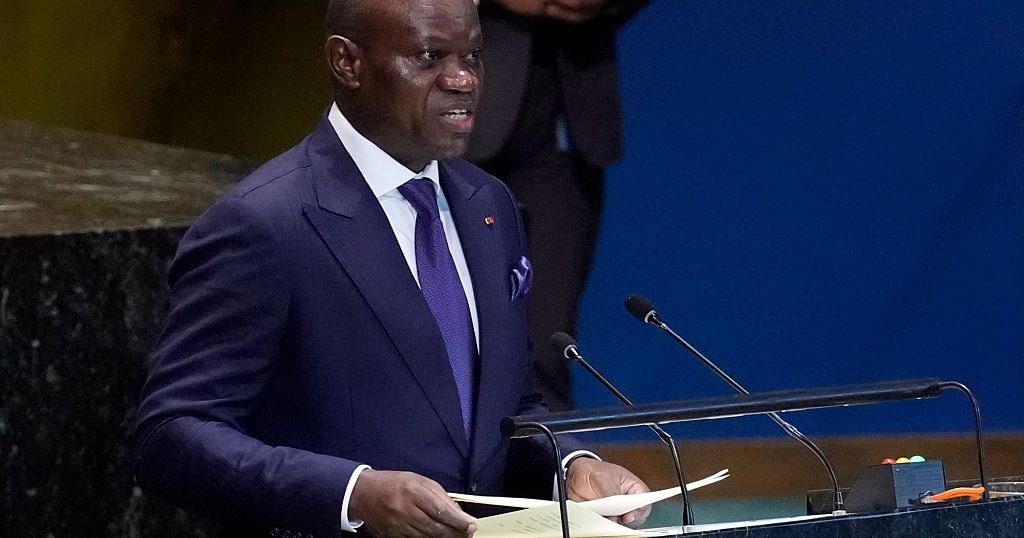
The electoral process for Gabon’s local and legislative elections is officially underway.
The timetable for the September 27 vote has been announced and members of the national election commission have been sworn in by the Constitutional Court.
The revision of electoral rolls across the country begins on July 14 and continues until August 12. This will ensure new voters are added and deceased or ineligible voters removed from the rolls. It will also register any changes of voting centre and update personal data.
People aged 18 and over with a Personal Identification Number (PIN) are automatically registered and need only choose their polling center.
Local electoral commissions will be set up by July 26 and deployed across the country and abroad.
Nominations for the legislative and local elections are open from July 27 to August 7.
Fifth Republic
The Ministry of the Interior and national election commission reaffirmed their commitment to ensuring “credible, transparent and peaceful” elections, and called on citizens to play an active part in building the Fifth Republic.
Last week, two years after seizing power in a coup, President Brice Oligui Nguema unveiled a new political party, the Democratic Union of Builders, or UDB. Oligui secured nearly 95 percent of the vote in April’s presidential election.
The launch of the UDB appears to signal Oligui’s intent to transition from military leader to long-term political figure. While he initially presented himself as a reformer leading a transitional government, the creation of a political party gives structure to his leadership and a platform for future governance.
Africa
Forty years and counting: CAR once again postpones local elections
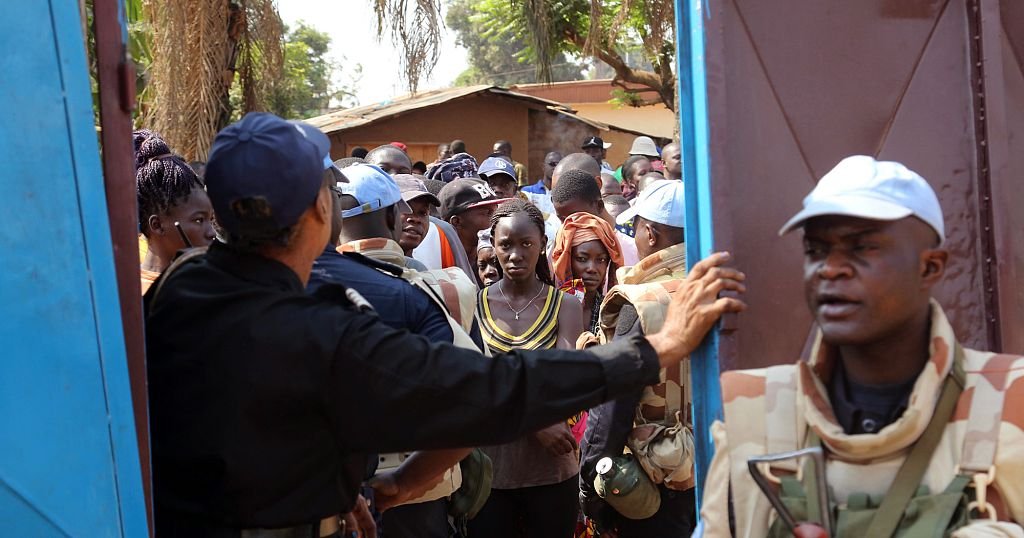
Scheduled to take place for the first time in almost forty years, local and municipal elections in the Central African Republic have been once again postponed.
Initially planned for the end of August, officials say the vote will now be held in December, in conjunction with the legislative and presidential elections.
President Touadéra, who has been in office since 2016, launched a biometric voter registration exercise last year to update the electoral roll.
Authorities say the postponement is due to a delay in mobilizing funds as well as technical and organizational hiccups.
Members of the opposition BRDC are calling for an overhaul of the electoral authority and a dialogue with President Touadéra.
CAR has been battling conflict since 2013 when predominantly Muslim rebels seized power and forced the then-president from office. The United Nations has said the elections represent a ”crucial opportunity” to strengthen democratic governance, promote reconciliation and consolidate stability.
The landlocked country is one of the poorest in the world, despite having significant natural resources, including uranium, oil, gold and diamonds.
-
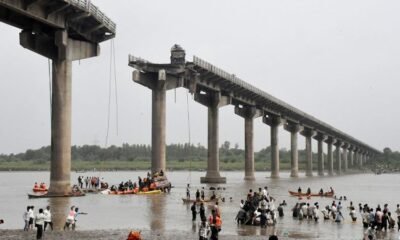
 Asia5 days ago
Asia5 days agoGujarat state: Bridge collapse kills 9 in India
-

 Europe5 days ago
Europe5 days agoTrump promised 200 deals by now. He’s gotten 3, and 1 more is getting very close
-

 Asia3 days ago
Asia3 days agoAir India crash: Engine fuel supply was cut just before Air India jet crash, preliminary report says
-
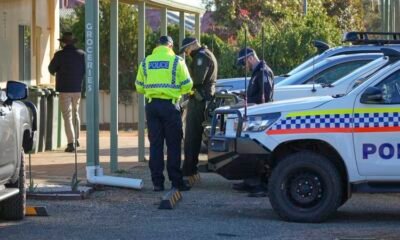
 Europe3 days ago
Europe3 days agoGerman tourist found alive 12 days after she was lost in the Australian Outback
-
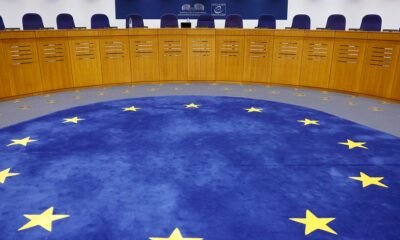
 Africa5 days ago
Africa5 days agoTop European court delivers series of damning rulings against Russia
-

 Europe2 days ago
Europe2 days agoAs South Korea becomes a key arms supplier to US allies, its best customer is on the edge of a warzone
-

 Lifestyle4 days ago
Lifestyle4 days agoHealthy workday snacks include a smart mix of energy-boosters
-

 Lifestyle3 days ago
Lifestyle3 days agoOne Tech Tip: All the ways to unsubscribe, after ‘click-to-cancel’ was blocked




